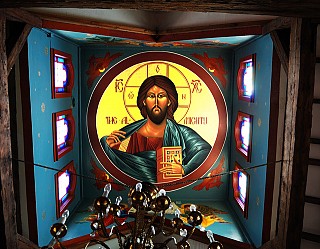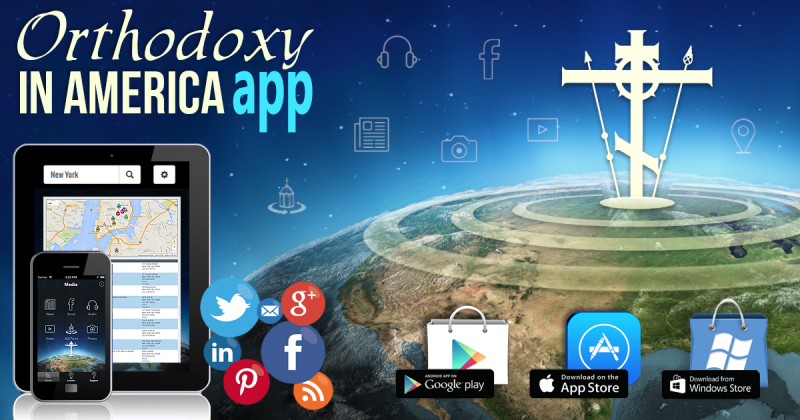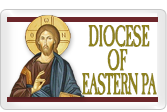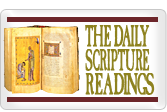"An Oasis in the Desert"
Dr Eric Affsprung
I was raised in a mainline Protestant church and am very grateful for that. Moreover, I have always been drawn to places of worship and to religious books and ideas. My family lived in Austria for a year when I was a child and I am told that I would walk to the front of the European churches that we visited to gaze up at the altar. In Rome I was intrigued by the ancient ruins and the Christian catacombs. When I was older, while working in northern New Mexico, I was drawn to the indigenous Roman Catholicism of the high desert country. I can also recall one summer atternoon, while working in Colorado with the Forest Service, walking through the woods and thinking that perhaps I should enter the ministry, although I am not sure where this notion came from. That led to a brief stint in a Protestant seminary. However, being much too immature, I withdrew after one year.
By my late-20's I had lost my spiritual moorings. I knew that something was missing from my life but I was not even sure what I was looking for. Things were complicated by a loss in my childhood and by other early challenges, things which made me distrustful of happiness and relationships, and which left me with an angry, defensive attitude toward God and Christianity.
Unfortunately, the church of my youth was no longer a refuge. Increasingly, Protestantism seemed to have been co-opted by the modern culture, spiritually dead and theologically empty, at times more like a kind of social club or self-righteous political activism than faith. Like many young people, I flirted with Eastern religions, but I also understood on some level that these offered only an empty, nihilistic and self-absorbed experience of reality, and that I could not walk away from the church of Christ (even though I was not at all sure that He wanted anything to do with me). But where was that church? And was there a place for me within it? Something always seemed to be blocking my path. Was it my own emotional immaturity, stubborn pride and lack of faith? Was this God's way of telling me that I was on the wrong path?
Moreover, having been brought up with a "Western" mindset, it seemed as if the modern Christian was faced with a terrible, impossible choice. I could put on intellectual blinders and approach the Scriptures like a "fundamentalist", with lots of emotion and doing my best to ignore the world of the mind, I could try to adopt the barren "post-modern" and "de-mythologized" faith of many of my peers, or I could abandon Christianity altogether. The first choice was impossible for me and the second and third would have left me with a life devoid of hope or meaning.
Then I encountered the Orthodox Church. People have asked me how I found Orthodoxy. Truly, I have no real idea what brought me to the front steps of Holy Cross Church in Williamsport that first Sunday. I can only believe that it was the work of the Holy Spirit taking pity on a lost soul.
The friendliness of the Holy Cross community and the beauty of the Liturgy drew me in. Then, in the Orthodox Church, I discovered Holy Tradition and a new and profoundly different way of reading the Scriptures and understanding Christ's work in Creation. Within Orthodoxy there is room for the life of the mind and for the heart, for the intellectual and for mystery -- a mystery very different from anything I'd encountered before. Moreover, the Orthodox Church is a church built on a firm foundation and with a direct link to the ancient church of the Apostles.
In spite of my own stiff neck and stubborn kicking at the goads, I did finally join the Orthodox Church (taking the name Anthony) at the age of 54, thank God.
The Monastery of St. Anthony, arguably the oldest Christian monastery in the world, was established in the 4th century. It still stands today, built around a small palm oasis in the middle of the Egyptian desert. Finding the Orthodox Church was, for me, like stumbling onto an oasis after years and years of wandering in the desert. +
"Sweet Home, Orthodoxy"
Sem Jesse Dominick
I was raised as a non-denominational Evangelical Protestant in southern Pennsylvania. We were pretty conservative morally, and theologically in some ways -- we believed firmly in the Trinity, the Virgin birth, that Christ is God, that Christ is sinless, etc -- but we did not believe in liturgical worship, the sacraments, the Saints, etc. For us, salvation was "Once Saved, Always Saved;" I was saved forever, no matter what, because I had placed my faith in Christ as a child. I always believed in absolute truth (relative truth is an absurdity and this was always obvious to me) therefore I always believed that my particular brand of Christianity was the only true one. I remember arguing with some Catholic friends in middle schoo, telling them they were not Christians because Christians follow the Bible and the Catholics certainly don't! This is not something I hold to now as an Orthodox Christian, but nevertheless, such were my beliefs before becoming Orthodox. We were quite active in our church -- went to services three times a week -- and at various points in my life I would read the Bible daily. I never once doubted the truth of Christ.
Towards the end of high school and into the beginning of college I got into the partying scene, although, thank God I never got too crazy. When I got to Penn State (and didn't have my parents to make me go to church) I stopped going, although I never stopped believing in Christ. However, my life did not line up with this faith. I specifically remember one time when I was hanging out and drinking with several agnostic/atheistic friends. I was trying to convince them that homosexuality is a sin, and they pointed out to me that the Bible also says that getting drunk is a sin. I said "yes, but I'm saved, so its ok." I really thought this was some great line and that I had really "got" them. Looking back, this was, of course, completely ridiculous of me to think and say.
In the fall of my junior year when I was 20, I went to a Lynyrd Skynyrd concert with several friends. We ended up getting arrested because my friends were using an illegal substance. I was taken out of the concert with them and while being questioned the police smelled alcohol on my breath. I had already been charged with underage drinking in high school and had gotten in trouble with Penn State in my freshman year for drinking in the dorms. I was pretty sick of getting in trouble -- it's expensive to keep getting citations! And more importantly, my conscience was beginning to nag at me and I was ashamed of letting my parents down who had raised me properly in the Christian faith.
So I decided to stop partying, and while I was at it I decided to go back to church. By this time, I had encountered Gary Cattell, the "Willard Preacher." He is a well known street preacher on Penn State's campus who preaches outside the Willard Building (hence the name). He has been preaching on campus for over 30 years, and about 15 years ago he converted to Orthodoxy from Protestantism. At this point I knew nothing about Orthodoxy and I simply assumed Gary was the pastor of some Protestant church known as "Orthodox." So I went to nearby Holy Trinity Orthodox Church one Sunday, and boy was I shocked! Gary had nothing to do with the service, and as far as I could tell this was just some weird form of Catholicism! I hated it and told myself I'd never go there again! So I found a Baptist church online and I stated going there, where many other students attended. I also started going to several Protestant youth groups on campus. I was going to a different group almost every night of the week.
Fast forward to the Spring of that school year. I was listening to the Willard Preacher every day, and one day I remember hearing him speak about why he left Protestantism and embraced Orthodoxy. Somehow I had managed to listen to him for quite a while before finding out that he had once been a Protestant. Years before, a Catholic and Orthodox student confronted him about some things he was saying and they asked him to prove Sola Scriptura -- that the Bible is the sole authority in Christianity. Gary spent the weekend looking through the Scriptures and found out that the Bible never clalms to be the sole authority, but that it is profitable for salvation, whereas the Scriptures proclaim the Church to be the pillar and ground of truth. This eventually led to him entering that Church -- the holy Orthodox Church. As he spoke about the problem of Sola Scriptura and other problems with Protestantism I became intrigued. Everything he said made perfect sense to me. I never thought about these things before.
I was a bit of a unique case at Willard in that I knew almost right away that I would have to become Orthodox. I have seen many others convert who took years to finally come around and who wept and struggled hard, but everything fell into place for me. Suddenly all those things I rejected from my childhood faith -- liturgy, sacraments, Saints, etc -- all made perfect sense. I started regularly attending Holy Trinity and the Orthodox Christian Fellowship on campus where I made many good friends. The first service I went to this second time was in Lent and it must have been a Presanctified Liturgy (I remember thinking how cool it was that you could come out of Church sweating!). I went to many more services in the end of that semester, including Pascha which was the most amazing thing I'd ever seen.
I went home that summer and attended the local Orthodox Church several times, and when I returned to school in the fall of my senior year, I was enrolled as a catechumen in the first few weeks of the semester. In the ensuing weeks many other students became catechumens thanks in part to the influence of the Willard Preacher. I was very active in the parish and the OCF. We had Church-related events every day of the week except Fridays and we went on many retreats hosted by other OCF's and to various monasteries. I loved everything about the Church. I was baptized that school year -- on Holy Saturday, 2006 -- and it was undoubtedly the greatest moment of my life!
Conversion, though, is not a one-time event. It is ongoing throughout the remainder of our lives. My own conversion was mainly intellectual -- the doctrines and history of the Church all made sense and opened up an incredible depth of faith and praxis. I had not had any profound experience in an Orthodox Church and never been moved to tears by a service (as did some of my friends). I had, and still have, absolutely no doubts about the truth of the Orthodox faith. But my conversion is continuing in the struggle to bring my faith from my head into my heart. An absolutely essential element of this process for me has been the person and writings of Fr. Seraphim Rose who taught me to value love and humility and obedience over always being "correct." Fr. Seraphim is an American convert to Orthodoxy who became a monk and priest and a well-known author. He reposed in 1982, and many consider him to be a Saint, as do I.
I had converted to Orthodoxy because it is the truth, but soon after I converted I found out about the Old Calendarist groups who proclaim that they have preserved the truth even more fully than had the historic Orthodox Churches which they believed had compromised too much with the world. I was quite interested in these various groups for quite awhile -- they appealed to my desire for truth. But the biogrgphy and letters of Fr. Seraphim Rose which detail his dealings with such right-wing zealots helped me to see the errors of judging without love and schisming from the Orthodox Church, which these "True" Orthodox churches had one. Fr. Seraphim taught me that although the truth is of utmost importance, an essential element of that truth is to have a humble and loving heart which refrains from judging others. By his guidance and prayers and that of all the Saints, I continue to struggle to develop a truly Orthodox heart such as he had.
In 2010, I entered the Masters of Divinity program at St. Tikhon's Seminary.
My desire is to serve the Church in some capacity which I am still in the process of discerning. I am grateful to God that He used my mistakes for good and united me to Himself in His holy Church. I pray that I may continue to draw ever nearer to Him in the service of His Church! +
"South Tenessee to South Canaan"
by Fr Martin Watt
I was born of Methodist and Baptist parents in the mid 1960s. I was born in Knoxville, Tennessee, but grew up in Jackson, Tennessee, near Memphis.
I was christened in the Methodist Church at birth. I have the distinct honor of being the only person, to my knowledge, to have failed confirmation class.
When I first went through confirmation class, around age 11, my father who was the Baptist half of my upbringing, wanted to make sure I knew that the decision to be received in the Church was my decision, but that I should be prepared to keep that decision for the remainder of my life. It was his way of stressing the individual nature of the decision to accept Christ. I chose to decline the confirmation. The following year I was received into the Methodist Church.
I had the option of being rebaptized, and I chose that option, again being influenced by my father. I was baptized through the pouring of water on my head.
The following year my mom and dad decided they could best serve Christ in the Baptist Church. We all went along, and together with my mother I was baptized by immersion, marking my third baptism. Hopefully one of them "took".
In my early teens I felt a calling toward full-time Church work. I preached my first sermon at age 15 in a Baptist Church on a lay leadership Sunday. It was a miserable, but cute, failure.
I started college at Middle Tennessee State University after working at an AM Radio station in my hometown, and aspiring to be a recording engineer. During my freshman year, I learned that the best recording engineers made below the poverty level. I quickly determined I needed a new career. I had a friend who was in his third year of Harvard Law School, and spoke about his interviews for clerk positions. I was enthralled.
I wrote to a family friend who was a circuit court judge and corporate lawyer, and sought his advice. He advised taking all the accounting I could, which I did.
During college, I stopped attending Church. The Baptist Church was in the midst of a split between conservatives and moderates; a split that was quite nasty. I never lost faith but I did lose the connection with Church.
After graduating from college, I was tired of being poor and in school, so I accepted a job offer and began my career instead of pursuing law school. I got married to my high school sweetheart in 1987, and took a job transfer to the small East Tennessee mountain town of Kingsport in 1989. Our daughter was born in 1991.
Later that year, I was transferred to Fort Lauderdale, Florida. My wife and I began suffering culture shock. In order to alleviate the shock, we decided to seek out the only familiar thing we knew in south Florida and joined a small Baptist mission Church.
We enjoyed the experience, however I began to yearn for a more reverent, worshipful experience. I began searching for what I would later learn was called "liturgical" worship. I was also seeking to find out what needed to happen after the salvation experience in the Baptist church. They offered no framework for growth, nor was growth particularly emphasized.
My brother had lost his hearing in the navy, and we utilized a computer-based communications tool to keep in touch. This computer system also had discussion roundtables and I joined the Religion and Philosophy roundtable in order to investigate different faiths. I was particularly interested in the way faith was practiced at the personal level, as opposed to doctrinal or "official" levels.
I could not reconcile with the monarchial model of the Catholic church, and both the Episcopal and Lutheran Churches were going through splits similar to the ones that chased me from the Baptist Church. However, there was a group of four people who made up the Eastern Orthodox roundtable. They patiently entertained my questions, and were gentle in helping guide me in the way they saw the relationship between faith and life. I had my first experience with Orthodox worship for the feast of the Three Hierarchs, January 30, 1994.
I was blessed to find a group of former evangelicals who had converted some years before. They were able to help me grow toward the faith, as it was a path they has also begun to tread.
My wife, daughter and I were received by chrismation into the Orthodox Faith in October, 1995 after being catechumens for 18 months, at St. John the Evangelist (Antiochian) Church in Memphis, Tennessee. Soon after the birth of our son Jonathan, we moved to Dayton, Ohio and joined St Paul the Apostle parish (OCA). After completing the Diaconal Vocations program offered by the Columbus Deanery in 2007, I was ordained to the Diaconate at St Paul Church in Dayton by Archbishop Job of blessed memory in October, 2008.
During this time, I was a healthcare consultant and executive, spending time flying around the country. Typically I'd leave on Sunday evening and return home Friday evening. I really began to miss my family, and looked for opportunities for us to be together.
In early 2010, after six years of traveling, I left my career as a healthcare exectuve and began to pursue the Masters of Divinity degree and possible priesthood at St. Tikhon's Seminary. I chose St Tikhon's because of the richness of the liturgical services as experienced in the monastery church, I have always felt strongly that the Academic preparation can be attained in many locations, but the liturgical formation so necessary to the Christian life is found most fully in the monastic setting. St Tikhon's allows me to pursue both goals.
On the feast of the Lord's Transfiguration, 2012, I was ordained to the Holy Priesthood by Archbishop Tikhon in St Tikhon's Monastery Church.
And the story continues...
"Culture and Family"
Sem Alexis Baldwin
From a young age, my parents taught me the importance of two very important realities: two experiences that we lived. These two realities were that of culture and family.
I grew up in the Mississippi Delta; the North Western part of the State of Mississippi. It is a very impoverished area but, like many places in the South, it is rich with culture. The Mississippi Delta Blues Festival was literally right down the road from our house. I remember walking down to it, in an open field. The bands were all there playing music and many people came to hear them. It was a real cultural experience, part of the life of the people. As with kindness, being gentle and taking care of others is a part of the culture down there. We helped our neighbors and they helped us. Even though we were from the North -- my father from Chicago area and my mother from Indianapolis, Indiana -- people welcomed us and we welcomed them. They treated us like we belonged there. We were family to them and they were family to us.
The reality of family is another thing we lived. We were close knit. Family was important to us. We even travelled back many times to Indianapolis to see our family and relatives -- aunts, uncles, cousins, grandparents. I was raised zealously nominal Roman Catholic. This was part of both family and culture. It was what we did as a family. Everybody in the family was Roman Catholic so we were too. It was a meeting of family and culture for me growing up.
Moving ahead to my senior year in High School, we moved to Phoenix. I met my future wife, Veronika, at the Catholic Church youth group. I graduated and got a job. My future wife and I both decided to go to Catholic Universities for our undergraduate degrees. I went to Franciscan University of Steubenville in Ohio and she went to Duquesne University in Pittsburgh. We graduated and moved back to Phoenix. I moved in with my Dad. We got married six months later. My Dad's neighbor was a retired French Chef from France and my Dad asked me if I wanted a job. I said yes and I began working for the Chef, Bernard. He taught me how to cook. (I am now the cook at St. Tikhon's Seminary and cook for all the Seminarians) I worked under the Chef for two years. After my wife and I got married we became catechumens in the Orthodox Church and then were Baptized Orthodox.
I had first been exposed to the Orthodox Church at the University. I had a friend who became my mentor; an old gentleman I met there named Todd. He taught me about the Orthodox Church, the Theology of the Orthodox Church, Patristics, St. Gregory Palamas and the Cappadocian Fathers. I had never had any experience with the Orthodox Church. There are Orthodox Churches in Mississippi, but there aren't many and thus not many people know about the Orthodox Church there. I wasn't taught anything about the Orthodox Church growing up. I had a little bit of experience of the Divine Liturgy and Orthodox Spirituality before going to University because I had visited some Byzantine/ Greek Catholic Churches, but it wasn't the fullness of the Orthodox Church. Todd introduced me to the Orthodox Church, but for me it was still just an intellectual knowledge of Orthodoxy, not the fullness. My future wife and I would drive up to a Greek Catholic Church in Northern Ohio while I was at University. I was searching for more. Not to say anything bad about Roman Catholicism, but if I'm honest with myself, I would say I was going to hell as a Roman Catholic, for a lot of reasons. The Orthodox Church -- Christ saved me. I was looking for more, for culture. I was looking for the Orthodox Church, to experience it.
Culture is not just something that you do. I was looking to live the Christian culture. We do this as Orthodox Christians. We say our morning prayers and our evening prayers. We have icon corners in our homes. We live out our tradition, our faith. Our Faith is our lived-out Christian culture. We have culture in Christ. The Church is our Family. That's what I was looking for; what I was yearning for. My wife and I were trying to live out Orthodox faith and spirituality without being Orthodox -- so we became Orthodox because we realized you couldn't be Orthodox without being in the Church.






